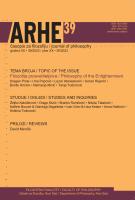Ruso, Kant i kritika prosvećenosti
Rousseau, Kant and the Critique of Enlightenment
Author(s): Đorđe HristovSubject(s): History of Philosophy, Ethics / Practical Philosophy, Political Philosophy, Philosophy of History, Philosophy of Education
Published by: Филозофски факултет, Универзитет у Новом Саду
Keywords: Rousseau; Kant; unsociable sociability; Enlightenment; courage; ignorance;
Summary/Abstract: In this paper, we examine Rousseau’s and Kant’s understanding of enlightenment through the lens of the idea of “unsociable sociability”, with the aim of showing that Rousseau’s critique of Enlightenment offers a different idea of courage from the one advocated by Kant in his essay What is Enlightenment?. In the first part of the paper, we explore Kant's idea of “unsociable sociability”, which he understands as a mechanism that leads to enlightenment and intellectual independence, demonstrating that the roots of this idea can be found in Rousseau's philosophical history of humanity. In the next step, we show how Rousseau argues against the idea of progress that Kant locates in “unsociable sociability”. Finally, based on these analyses, we show that Rousseau criticized Enlightenment and knowledge from the perspective of republican freedom, which, according to him, requires a different form of relationship between society and unsociability, and thus an alternative understanding of courage from that contained in Kant’s appeal “Sapere aude!”.
Journal: Arhe
- Issue Year: 2023
- Issue No: 39
- Page Range: 105-122
- Page Count: 18
- Language: Serbian

